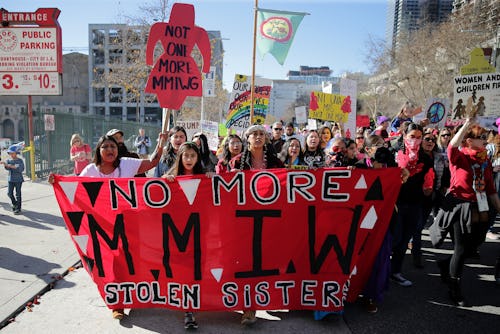Washington just became the first state to create an alert for missing Indigenous people
“It’s not just an Indian issue. It’s not just an Indian responsibility.”

On Thursday, Washington became the first state in the country to launch a dedicated, statewide alert system specifically for missing Indigenous people, with Gov. Jay Inslee signing into law the “Missing and Murdered Indigenous Women’s and People’s Alert System” that will mirror existing programs like Amber and Silver alerts for missing children and seniors, respectively.
“It’s not just an Indian issue, it’s not just an Indian responsibility,” Washington State Rep. Debra Lekanoff, a former Governmental Affairs Director for the Swinomish Tribe and the state’s only current Indigenous lawmaker, told the press. “Our sisters, our aunties, our grandmothers are going missing every day … and it’s been going on for far too long.”
This past October, a Government Accountability Office report stated that “the total number of missing or murdered Indigenous women [...] is unknown” on the federal level, thanks to a confluence of mitigating factors, including an atmosphere of tribal mistrust for law enforcement officials and differing rules for how tribal police are required to report missing children. The crisis of missing Indigenous people — particularly women — has become a major focus for Interior Secretary Deb Haaland, the first Native American Cabinet secretary. The new alert system in Washington State was signed into law almost one year to the day after Haaland created a dedicated Missing and Murdered unit within the Bureau of Indian Affairs Office of Justice Services, tasked with leading a federal effort to better coordinate law enforcement operations across agencies and jurisdictions.
A 2018 report from the Seattle Indian Health Board’s Urban Indian Health Institute determined that even though exact numbers are difficult to asses, Washington State had the second highest number of missing and murdered Indigenous women, while Seattle itself had more instances than any other city in the country. The institute also determined that Indigenous women go missing at a rate four times that of white women.
“What’s the most important thing is bringing them home, whether they’ve been trafficked, whether they’ve been stolen or murdered,” Tulalip Tribes of Washington Chairwoman Teri Gobin told the Seattle Times. “It’s a wound that stays open, and it’s something that we pray with each person, we can bring them home.”
The Indigenous alert bill was signed in conjunction with separate law that gives county coroners new guidances on how to identify, and return the remains of Indigenous peoples to their families and tribes.